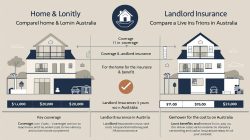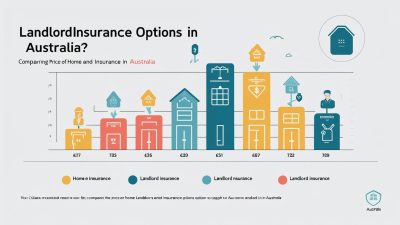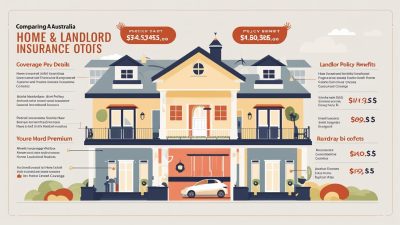Is Home Insurance Compulsory in Australia?
Bloggerbanyumas.com – Home insurance is one of the most critical forms of protection for homeowners. Whether you own a house or rent, ensuring that your property is properly insured is a key consideration in managing financial risks. However, homeowners across Australia often find themselves questioning whether home insurance is a compulsory requirement in the country. While home insurance may not be legally mandatory in all circumstances, there are situations where it becomes a necessity. In this comprehensive article, we will explore the requirements, types of home insurance available, and the specific cases where home insurance is compulsory in Australia.

The Legal Landscape of Home Insurance in Australia
What Does the Law Say About Home Insurance in Australia?
In Australia, home insurance is not universally mandated by law. Unlike car insurance, which is a compulsory requirement in all states and territories, home insurance laws vary depending on whether the property is owned or rented, and other specific circumstances such as the terms of a mortgage or the property’s location.
Home insurance is typically voluntary for homeowners. This means that, in most cases, there is no legal requirement that forces you to insure your home. However, the risk of not having adequate insurance can have significant financial consequences if damage or loss occurs.
For renters, the situation is a bit different. While contents insurance (which covers personal property within the rental property) is not compulsory by law, it is often highly recommended. Renters may also be advised by their landlord to obtain insurance, but again, this is not a legal obligation.
When is Home Insurance Required by Law?
Although home insurance is not universally compulsory, there are specific situations where it becomes necessary under Australian law:
- Mortgage Lenders and Financial Institutions: If you have a mortgage on your property, your lender may require you to take out home insurance as part of your loan agreement. While this is not a legal requirement, it is a condition set by most financial institutions to protect their investment in your property. The mortgage lender may specify the level of coverage needed, and failure to maintain this insurance could result in penalties or even the termination of the loan.
- Strata Insurance: For properties that are part of a strata title scheme (such as apartments or townhouses), strata insurance is mandatory. Strata insurance typically covers the building’s structure and common areas, but individual homeowners or tenants are still advised to take out contents insurance for their personal belongings.
- Natural Disaster Areas: In regions that are prone to specific natural disasters like floods, fires, or cyclones, insurers may require home insurance policies to include coverage for these risks. While not all areas in Australia face such risks, those in high-risk zones may find it difficult to obtain loans or even maintain ownership without ensuring their home is adequately protected.
- Home Insurance in Case of Sale or Purchase: When buying or selling a property, home insurance is often a crucial factor. In many instances, homebuyers will need proof of home insurance before completing the transaction. This ensures that both parties are protected against unexpected damages that could affect the property’s value.
Understanding Home Insurance Options in Australia
While home insurance may not always be a legal necessity, choosing the right insurance policy for your property is crucial. Australians can choose from various insurance options based on the type of coverage they need. Here are the common types of home insurance available:
1. Building Insurance
Building insurance covers the structure of your home, including the walls, roof, floors, and built-in fixtures such as windows, doors, and plumbing systems. This is the most common type of insurance for homeowners because it protects the most valuable asset—your home—against damage from events like fire, storm, vandalism, or other natural disasters.
2. Contents Insurance
Contents insurance covers the personal belongings inside your home, such as furniture, electronics, clothing, and other possessions. This type of insurance is essential for renters, as it ensures that if their possessions are damaged or stolen, they will be able to replace them.
3. Combined Building and Contents Insurance
A combined policy provides coverage for both the structure of your home and the contents within it. This type of policy is suitable for homeowners who wish to safeguard both their property and belongings with a single insurance plan. It offers convenience and often comes at a more affordable rate compared to buying separate policies.
4. Landlord Insurance
For those who own rental properties, landlord insurance is crucial. This policy not only covers the structure of the home but also protects against tenant-related issues, such as unpaid rent or damage caused by tenants. This insurance is designed to provide peace of mind for property owners.
5. Strata Insurance
As mentioned earlier, strata insurance is mandatory for properties in a strata scheme. This insurance typically covers common areas like hallways, elevators, and pools. It does not cover individual apartments or units, so unit owners are still encouraged to take out their own insurance for personal property and contents.
Why is Home Insurance Important in Australia?
Protecting Your Financial Investment
While home insurance is not compulsory for most Australians, the risks associated with not having coverage are high. Homes are one of the largest financial investments a person will make in their lifetime. Without adequate insurance, homeowners risk losing significant amounts of money in the event of an unforeseen incident. For instance, a natural disaster like a fire, storm, or flood can completely destroy your home and leave you financially devastated if you do not have coverage.
Risk Mitigation for Homeowners
Having home insurance mitigates the financial risks of property damage or theft. Whether you experience accidental damage, a break-in, or a natural disaster, home insurance provides the safety net needed to recover without suffering overwhelming financial losses.
Mortgage Protection
For those with mortgages, home insurance can also serve to protect both the homeowner and the lender. In the event of significant damage to the property, insurance ensures that the lender’s investment is protected and that you, as the homeowner, do not face massive out-of-pocket expenses for repairs or rebuilding.
Is It Worth Getting Home Insurance?
Although home insurance may not be compulsory, it is highly recommended for every homeowner or tenant in Australia. In many cases, securing home insurance provides a sense of security and financial stability, knowing that you are covered in the event of an emergency. The cost of insurance premiums is usually outweighed by the protection it provides, and in areas that face higher risks of natural disasters, the need for coverage becomes even more apparent.
Key Takeaways: Is Home Insurance Compulsory in Australia?
In conclusion, home insurance is not compulsory in Australia for most homeowners. However, there are specific circumstances—such as having a mortgage, being part of a strata scheme, or living in an area at risk of natural disasters—where having home insurance may be required. Additionally, it is highly advisable for all homeowners and renters to take out insurance to safeguard their financial investment and protect against the unexpected.
Before deciding on the type of insurance you need, it is essential to review your situation carefully. For mortgage holders, check your loan agreement for insurance requirements. For renters, consider taking out contents insurance to protect your personal belongings. And for those in high-risk areas, consider policies that cover natural disaster damage to ensure your home is fully protected.
While home insurance may not always be legally mandatory, it remains an essential safeguard in today’s world. Protecting your home means safeguarding your future.
This comprehensive guide on home insurance in Australia offers in-depth insights into the legal requirements, types of insurance policies, and reasons why home insurance is critical for all Australians. By ensuring your property is adequately insured, you can avoid costly financial setbacks and gain peace of mind knowing your home is protected from unforeseen risks.












